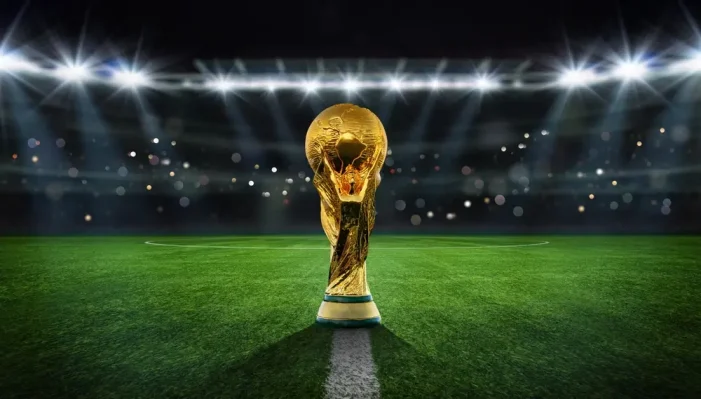By Juan Avilez and Rich Andre, American Immigration Council | Editorial credit: Igor Link / Shutterstock.com
The inaugural FIFA Club World Cup (CWC) kicked off on June 14 in Miami, Florida. The new 32-team competition brings together soccer (or football) clubs from around the world. The CWC resembles the better-known FIFA World Cup, where a host country welcomes fans of all backgrounds united by their love of “the beautiful game.” The CWC aims to create a similar melting pot of fandom, with 20 countries represented among the participating clubs.
FIFA reiterates this mission on its website, stating that, “FIFA is committed to respecting all internationally recognized human rights and promoting the protection of these rights. It has the obligation to constantly promote football globally in the light of its unifying, educational, cultural and humanitarian values.”
But the opening match of the CWC between Lionel Messi’s Inter Miami and Egypt’s Al Ahly was marred by news that U.S. Customs and Border Protection (CBP) officials would be present at the game. In the days since, there have been countless examples of immigration officials threatening to, or directly interfering with, the tournament’s events. These recent developments cast doubt as to whether the Trump administration’s immigration agenda can coexist with this global sporting event – or the much bigger FIFA World Cup coming to the United States next summer.
How does the Trump administration’s immigration agenda impact the CWC?
The administration’s immigration policies are both directly and indirectly impacting the fan experience at the CWC.
Just one day before the opening match, a CWC kick-off party on a boat — attended by Miami-Dade County Mayor Daniella Levine Cava and FIFA officials — abruptly ended when CBP boarded the vessel. Though CBP claims it was a routine inspection, some attendees reported that crew members were asked about their immigration status. Shortly after, U.S. Immigration and Customs Enforcement (ICE) said that all noncitizens attending the CWC must carry proof of legal status.
At the opening match in Miami, CBP was present, as confirmed via a now deleted social media post. While the local sheriff described the federal agency as just part of the security team, immigrant advocates noted that Miami-Dade County operates under a 287(g) agreement with ICE, which deputizes local officers to act as immigration officials underscoring Miami Dade’s pre-existing relationship with immigration enforcement.
Beyond these direct actions, the Trump administration is also implementing restrictive policies like travel bans and increased vetting of travelers going through customs – these indirectly impact immigrants residing in the United States who attend CWC games and fans traveling from aboard.
On June 4, President Trump issued a proclamation limiting the entry of nationals from 19 countries, mostly in Africa and the Middle east. The travel ban includes Iran, one of the countries that has qualified for next year’s tournament. While there is an exception for World Cup athletes, coaches, and their immediate relatives, no such exemption exists for extended family, friends, or Iranian fans in general.
According to reports, the administration is considering extending these restrictions to 36 more countries, which could spell disaster for many 2026 World Cup fans, impacting their ability to travel to U.S. games, lessening the Cup’s economic boom as well as the sense of global comradery among fans.
At the same time, the administration’s actions within the United States could have a deterrent effect on World Cup fans already in the United States with ICE conducting highly visible and often violent mass arrests and detentions of noncitizens in homes, schools, workplaces, and other public spaces. The fear of arrest among immigrant communities – and those who may be profiled as being undocumented – is having a chilling effect on immigrant communities throughout the country. Sporting events like the CWC are no exception.
How has FIFA responded to increased immigration enforcement at the CWC?
FIFA has mostly stayed mum on immigration issues, at least publicly.
In fact, FIFA President Giani Infantino has gone to great length to curry favor with President Trump. He attended the president’s inauguration and met with Trump at the White House. And responding to the president’s opposition to diversity, equity and inclusion, FIFA announced it was abandoning its long-running anti-racism and anti-discrimination messaging at CWC venues to maintain “political neutrality.”
Privately, however, FIFA officials pushed back on CBP’s social media post about their presence at CWC matches and managed to get the post deleted.
What has the reaction been among soccer fans?
Immigrant communities are driving the growth of the beautiful game in the United States, including the domestic Major League Soccer. It’s no surprise, then, that supporters have been among the first to speak out against the Trump administration’s immigration actions and their adverse impacts on the soccer world.
Following an ICE operation in Nashville, the Nashville SC supporters’ group “La Brigada de Oro” boycotted the next match in solidarity with their immigrant supporters. Nashville SC matches are one of the best attended in MLS. Their supporters recognize how instrumental the immigrant community is to that.
It stands to be seen whether other supporters’ groups, teams, or even athletes will go public with a similar message opposing unjust targeting of immigrants. The world will be watching this summer and in 2026.

